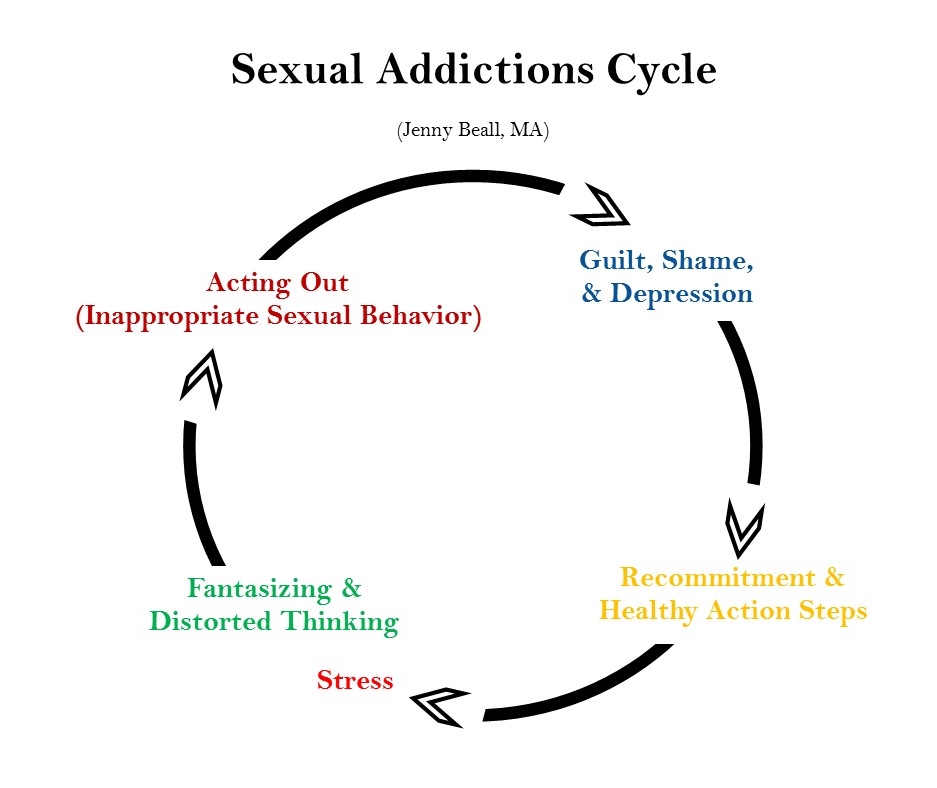Sexual Addictions
Learn about the sexual addictions cycle and how therapy can help. Learn why pornography use is damaging both personally and to your relationship.
What is sexual addiction?
Sexual addiction refers to a pattern of sexual behavior, compulsions, and thoughts which often have negative consequences on the individual’s emotions, relationships, and other areas of daily functioning.
Isn’t it good to have a healthy Sex life?
Absolutely! We believe God created sex as a gift for marriage and it is critical for building intimacy and connection between spouses. It would be a mistake to dismiss the healthy aspects of our sexuality. Sexual addiction involves sexual behavior that crosses a line either for the individual or their family members. Often the person’s actions lead to personal feelings of guilt and shame, unsafe sexual practices, violations of trust in relationships, infidelity, and an escalation in the acts that are necessary for sexual satisfaction.
Like other addictions it often seems harmless at first and often progresses to more damaging sexual acts and pervasive thinking. Most people don’t wake up one morning and decide they want to engage in unsafe sexual acts with a stranger or put their job or marriage at risk by having sexually explicit conversations during their lunch break, it starts more subtly. Most of the people we see report feeling their first obsessive thoughts around puberty after coming across a friend’s pornography stash, or even looking at the lingerie section of their mother’s Kohl’s catalog.
So what is your perspective on Pornography?
 There are some sexual addictions programs that promote pornography use as a coping skill and acceptable alternative to “acting out” on inappropriate sexual urges; we do not share this view for a number of reasons.
There are some sexual addictions programs that promote pornography use as a coping skill and acceptable alternative to “acting out” on inappropriate sexual urges; we do not share this view for a number of reasons.
- Porn often promotes self-centered, violent, and non-consentual expressions of sexuality that are not part of a healthy relationship.Porn use can encourage unrealistic sexual expectations even in an otherwise healthy marriage. People become conditioned to more extreme sexual images and/ or stimulation, so it can be more difficult to have a satisfying sexual relationship with ‘just’ your spouse.
- Beyond mental conditioning, porn also has negative effects on sex drive and physiological responses to healthy sexual expression. It can be more difficult for spouses to become aroused and to maintain their arousal due to desensitization that occurs in pornography use.
- Porn in many ways is like the “gateway drug” for other forms of acting out, so even if people do not have a moral issue with viewing pornography, it often acts as a trigger and makes other acting out more likely. You wouldn’t tell an alcoholic to drink beer so that they don’t slip and drink hard liquor, so why would we encourage a sex addict to view pornography? This seems to be our cultural response to the problem, but it is not backed by research or logic.
What else comes with sexual addiction?
There is often great shame associated with the thoughts and behaviors and it can be very difficult and painful to open up about, but we believe there is enough grace for any sexual struggle. Some people have stories of sexual abuse in their past, but this is not a prerequisite for sexual addiction. And sexual addiction is not the same as being a sexual offender, although some offenders may struggle with sexual addiction. Everyone’s story is different.

Research has shown that sexual addiction urges and acting out behaviors effect the brain and neural pathways in a comparable way to drug and alcohol addictions; the physiological connections are part of what makes it such a challenge to face without help. Our therapists have specialized training in the cycle of sexual addiction. See the model below.
Not everyone is ready to change their behaviors when they first decide to seek help, and that’s ok too. People come to therapy with different levels of concern and at different emotional places. Some individuals come because their behaviors have gotten out of control to the point that they are facing serious negative consequences in their lives such as losing their relationships. On the other hand, if you think you might have a problem and just want to talk with someone about your concerns we can help you assess your situation as well. We can come alongside you wherever your at, and walk with you without judgment. Healing can really begin only when dark secrets are brought into the light, so we offer a safe place to work through these issues, address the deep shame and guilt, find accountability, and start finding freedom.
What does therapy for sex addiction look like?
Again since every story is different, Everyone’s therapy process will be a little different, but there are some common elements. First, we will help you to identify the problem thoughts, feelings, and behaviors. This may include identifying triggers and helping clients who are ready to set boundaries and find additional accountability to avoid acting out in the future.
After putting safeguards in place, we dig deeper under the behaviors for the reason they are happening. Sex addiction seems simple, but it is really never about sex. People act out because of deep unmet needs that may vary from person to person. Some people have a need for belonging, acceptance, power, and the list goes on. Once we identify the unmet needs that the individual is seeking to meet that insight can help the client to challenge their thinking and get better control over their compulsions and we can develop healthy ways for them to meet those needs.
There is a lot of repair work involved in healing the wounds of sexual addiction. Therapy can help to address the shame and guilt on a personal level. We also help clients to rebuild trust and repair relationships that have been affected by their actions. As part of dealing with sexual addictions we also work with spouses and significant others who and have been hurt by their partners’ unfaithfulness. We understand that the experience of infidelity is very painful and can feel isolating and we are here to sit with you through tears, anger, and the hard work of moving forward. Not all relationships can be restored, but whether you want to rebuild trust or decide you need to walk away, we can help you deal with the feelings of betrayal and move toward wholeness.
If sexual addiction has impacted your life, we hope that you will take that first brave step and contact us, you don’t have to walk through it alone.
